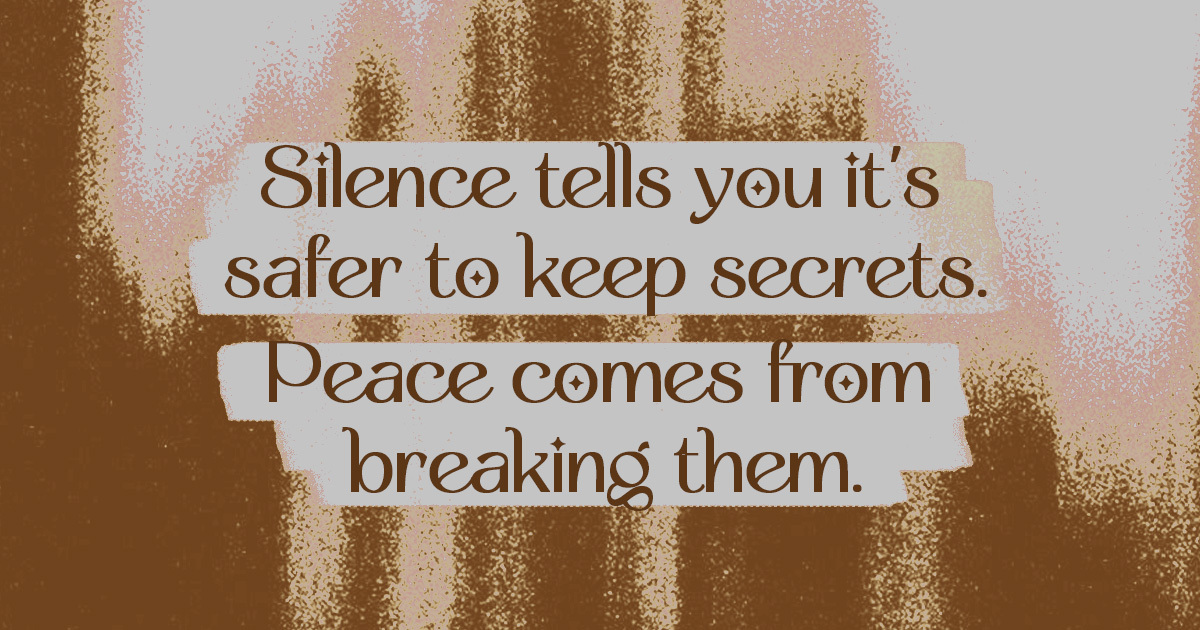The worst lie I ever told wasn’t to a judge or a cop. It wasn’t even to the people I loved.
It was to myself.
The lie went like this: If I don’t talk about it, it’ll go away.
That silence almost killed me.
I learned to wear it like armor. Growing up, you don’t get a manual on how to survive loss, trauma, or the kind of nights that leave you staring at the ceiling fan until dawn. You just learn how to bury it. I buried everything. The jail stints. The addiction. The violence in my home. The nights I wanted to end it all.
But silence isn’t peace. It’s a cage. And the longer you sit inside it, the smaller the world becomes.
I thought I was protecting people by keeping quiet. I thought I was being strong. What I was really doing was teaching myself how to suffocate in plain sight. I smiled through family dinners, cracked jokes on job sites, showed up for the people I loved—and all the while, I was bleeding out inside.
It caught up to me one night in a way I’ll never forget. I was lying on the bathroom floor, shirt pressed to a wound, trying not to black out. The person I had built a life with was the one who put the knife in my back. But the deeper wound was the silence I had lived with for years before that moment—the silence that taught me I didn’t deserve to ask for help, that no one would believe me, that men weren’t supposed to break.
I survived. Barely. And survival comes with its own guilt. Why am I still here when others aren’t? What do I do with this second chance?
For me, the answer has been writing.
I started The Rewritten Path on Substack with no plan other than this: tell the truth out loud. No filters. No hiding. In just two months, over 10,000 people have read my words—and many of them write back. Twice now, readers have told me that something I wrote stopped them from ending their lives that night. Those messages broke me open in a new way. They showed me that my survival wasn’t just for me. It was for the next person scrolling in the dark, wondering if they can hold on.

That’s what silence steals: connection. It convinces you that you’re the only one drowning, when the truth is, there are millions of us treading the same water. And the moment you speak—even shakily, even in fragments—you realize you’re not alone. Someone out there will recognize your story on their own.
Silence tells you it’s safer to keep secrets.
Peace comes from breaking them.
I don’t write because I’ve got all the answers. I write because I don’t want anyone else to think their pain has to stay hidden. Because I know what it’s like to be one decision away from disappearing. And because I’ve seen with my own eyes that words—raw, scarred, unpolished words—can pull someone back from the edge.
If you’re carrying something heavy right now, I want you to know this: you don’t owe anyone a polished version of your truth. You don’t need the perfect words. You just need to start. Tell one friend. Write one line. Whisper it if you have to. Anything that cracks the silence is a victory.
Because the cost of hiding is too high.
Because silence is not peace.
And because your life matters, even when you can’t feel it.
People need other people. You are not weak for wanting or needing support. If you’re seeking professional help, we encourage you to use TWLOHA’s FIND HELP Tool. If you reside outside of the US, please browse our growing International Resources database. You can also text TWLOHA to 741741 to be connected for free, 24/7 to a trained Crisis Text Line counselor. If it’s encouragement or a listening ear that you need, email our team at [email protected].
Arman
Hi there, I just happen to came across to this site for stories that people have had or has experiences with struggles within themselves. I read your stories and made teary eyed whilst I’m on my way to work this morning. I hope everyone like us could the chance to read your stories and making them feel loved and valued. Thank you, I’ll keep coming back to this site. Now I know, that I’ m alone on this journey.
TWLOHA
We are so glad you found Mark’s words. You are most definitely not alone. Thank you for reaching out and for sharing.
Traci Edwards
This is such a heavy and beautiful post, Mark. The loss, the pain we carry, the moments of tears for just missing the person we cared for, and the weight we wear to! All because of losing someone we loved that we wished we could have done more for. There is no judgement in how one person manages their pain, but getting through to someone in hope that we can help give them another day and then another day after is priceless and I know you have done that for many.
Barb
Thank you for so eloquently describing the silence that comes from wanting to be perfect, good and right in the eyes of others, while quietly bleeding out.